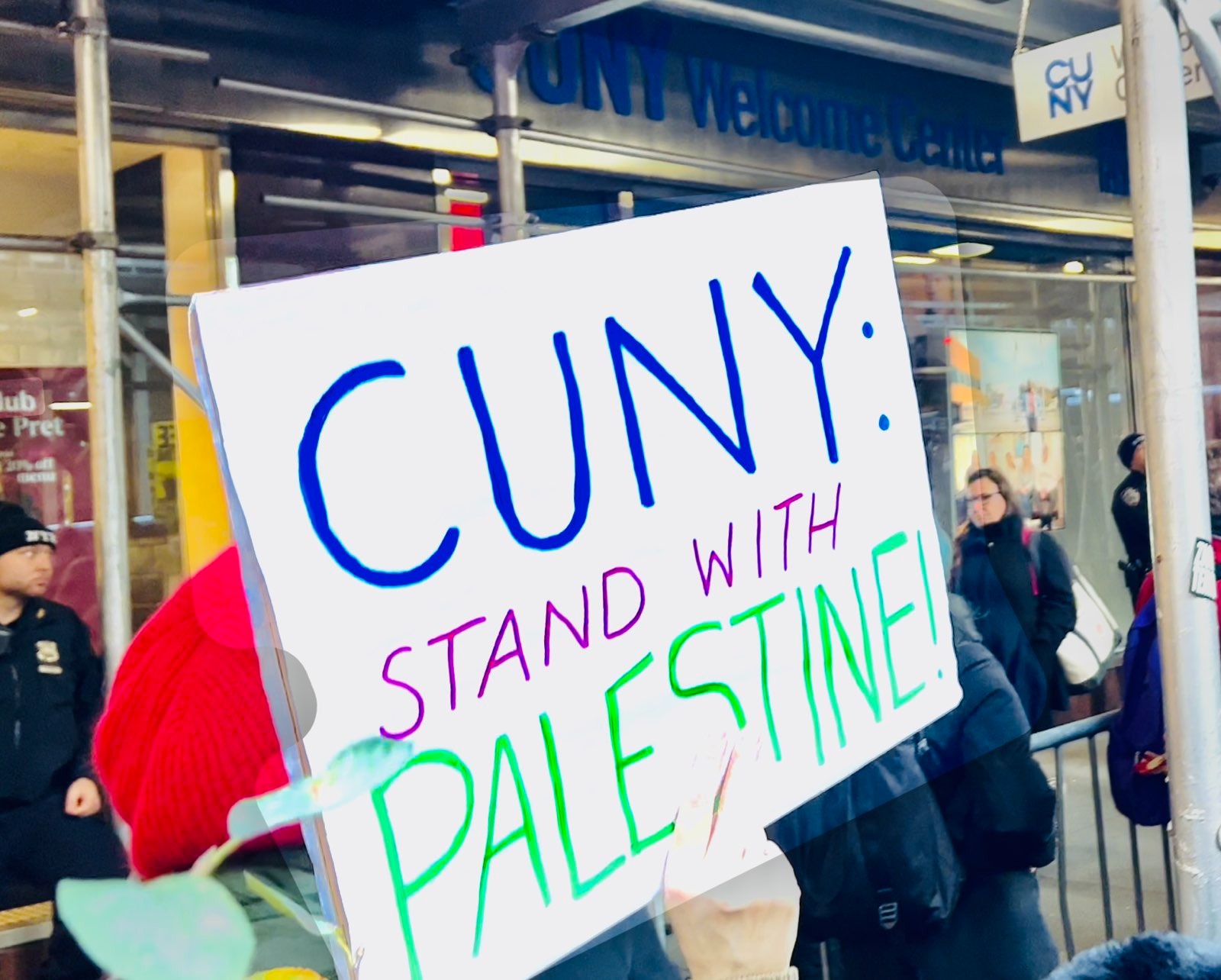By Marianne Madoré & Angela Dunne

“CUNY-wide rally for Palestine in front of the Chancellor’s office, November 2nd (credits: Rosavilla, 2023)”
We are witnessing genocide against the Palestinian people–a fact that has been corroborated by legal scholar and human rights attorney Noura Erakat, former director of the New York Office of the United Nations High Commissioner for Human Rights Craig Mokhiber, as well as professor of Holocaust and genocide studies Raz Segal. The century-old Zionist settler-colonial enterprise is once again showing the world its immense cruelty. As we write this, the Israeli Occupation Forces are bombarding Palestinians in Gaza relentlessly, killing thousands of elders, young men and women, parents, uncles and aunts, cousins, toddlers, and infants. They are burning people alive with white phosphorus, blocking access to food, water, fuel, and electricity. In the meantime, the occupation forces have also abducted thousands of Palestinians in the West Bank and raided the city of Jenin, while settlers have escalated their attacks on Palestinian farmers. Here at the City University of New York, Chancellor Félix Matos Rodríguez has released statements that fully disregard the unadulterated violence being perpetrated on the Palestinian people and attempt to equate calls for the liberation of Palestine to celebrations of terrorism or antisemitism.
In the face of this continued erasure of the Palestinian people, graduate students at CUNY have just received reflections and teaching strategies from the Graduate Center’s Teaching and Learning Center (TLC). The blog post written by the director of the TLC Luke Waltzer and titled “Teaching Amidst Turmoil” urges us to “be inclusive” of “conflicting views” in the classroom about “the ongoing violence in the Middle East.” We have read these suggestions with outrage and disappointment. In the last few years, the TLC has been instrumental in fostering comradely conversations about “abolitionist,” “reparative,” “liberatory,” and “decolonial” pedagogies at the GC, and yet, it is now inviting us to “move the conversation to a meta-level” because of the “tense political context.” This is indicative of the moral vacuity of the people who run our university and their investment in maintaining the systems of oppression they benefit from.
The only time “Teaching Amidst Turmoil” alludes to questions of power is to exhort us to “be aware of the power you have in your role as the facilitator of the course, and the responsibility that this brings.” The TLC had nothing to say about the cynical power of the CUNY administration to suppress Muslim and Palestinian speech on campus, nothing to say about the lethal power of the political media apparatus which regurgitates Islamophobic and anti-Palestinian sound-bites and its responsibility in the killing of six-year-old Palestinian-American Wadea Al Fayoum and of Dr. Talat Jehan Khan, a Muslim Pakistani-American pediatrician, nothing to say about the terrifying power of the U.S. Senate and its recent resolution to condemn organizations like Students for Justice in Palestine, which has local chapters at Hunter College, Brooklyn College, the College of Staten Island and John Jay College, and nothing to say about the brutal power of the U.S. government which has sponsored the killing and displacement of Palestinians for decades.
Something else that “Teaching Amidst Turmoil” fails to mention is that CUNY undergraduate students are predominantly working-class, Black and Brown New Yorkers, with more than a third of them being immigrants. Old and new U.S. imperial wars have delineated the contours of their personal trajectories or those of close family members. For these students, questions of colonization, dispossession, and liberation struggles are not abstract concepts. In the words of Eve Tuck & K. Wayne Yang, “decolonization is not a metaphor.” For these students, what are the suggestions to “repeatedly push the discussion to focus on ideas and not groups or individuals” and “insist that comments be connected to course material” meant to achieve? These suggestions evoke liberal conceptions of the university as a marketplace of ideas, and they disregard the reality that Western knowledge systems have continuously discounted the lived experiences of racialized and historically marginalized groups of people. Palestinians’ humanity and their right to resist oppression are not topics for debates and conversations but the premise with which we enter any classroom.
Educators committed to speaking truly and precisely can’t take seriously pedagogical advice that would not even name Palestine, or Palestinians, occupation, apartheid, or genocide. Genocide is not “turmoil.” These are not the grounds on which one can build “a learning community.” Sadly, the TLC’s tiptoeing around the colonization of Palestine is on-brand for CUNY leadership and administration, which has repeatedly partnered with Zionist organizations. Since the early 20th century, CUNY students have been at the forefront of solidarity campaigns against the Franco regime in Spain, against the U.S. war on Vietnam, or for the liberation of Palestine. Today is no different, and students have been leading the way in organizing rallies, walk-outs, and teach-ins that bring light and context to the Palestinian struggle. Inspired by generations of CUNY students, we understand that our responsibility is to stand in solidarity with the Palestinian people and to speak up collectively against the terror unleashed once again against them. For faculty looking for resources to bring to their classrooms, we encourage you to start with the Palestinian Feminist Collective (PFC)’s Digital Action Toolkit. Echoing the PFC, “we call upon all our communities and co-strugglers to take immediate action: to get informed, to spread awareness, to speak out and up, to organize, mobilize, and to commit to standing on the right side of history.”

As I am teaching The American Experience in the Freshperson Year Seminar and Race and Ethnicity in the Sociology Department at Brooklyn College this Fall, I must comment that teaching about the bigotry and violence against people(s) in the past seems to be more “acceptable” than looking at what collectively “we” are doing today to each other today. As teachers, I think we should also think seriously about how we continue to contribute to the problems we deplore.